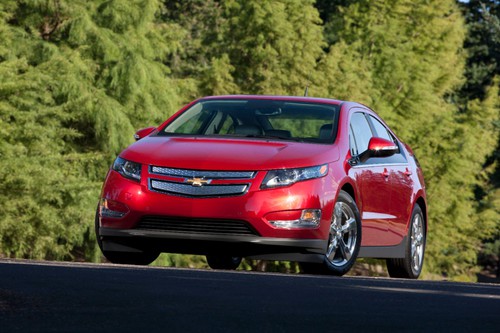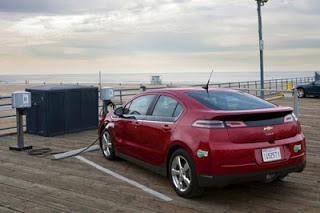The Chevy Volt may have sold the more units in North America than the Nissan Leaf et al, but that doesn’t mean GM really understands what to do with the Volt. Also, both Nissan and Tesla are showing more commitment to electrified-cars-with-plugs than GM is. Yes, GM is doing quite a bit, but why is the Spark EV a compliance car? In any case, a CNET News interview with a couple GM exec’s![]() (Dora Norwicki, Volt marketing manager at GM, and Randy Fox, a spokesman for GM Electric Vehicle Technology) proved to be illustrative about the difficulty GM has with marketing the Volt.
(Dora Norwicki, Volt marketing manager at GM, and Randy Fox, a spokesman for GM Electric Vehicle Technology) proved to be illustrative about the difficulty GM has with marketing the Volt.
According to the article, GM has sold 58,000 Chevy Volt’s to date – This is U.S. Sales, and in the next breath Randy Fox is quoted saying this is more sales than any other plug-in-electric-car. Nissan has sold well over 100,000 Leaf’s worldwide, but less than half were in the U.S.
On April 2, 2014![]() , Green Car Reports claimed there’d been 47,306 Nissan Leaf’s sold in the U.S. to date. Tesla Motors doesn’t report monthly sales, nor do much to help us understand details of their sales, however off the top of my head I’m guessing 35,000ish Model S’s sold in the U.S. so far, and it’s selling at a rate around 1,500 a month in the U.S. While GM has a lead with the Volt, it’s not that much of a lead, and both Nissan and Tesla could well catch up. What’s GM going to do to stay ahead, or pull further ahead?
, Green Car Reports claimed there’d been 47,306 Nissan Leaf’s sold in the U.S. to date. Tesla Motors doesn’t report monthly sales, nor do much to help us understand details of their sales, however off the top of my head I’m guessing 35,000ish Model S’s sold in the U.S. so far, and it’s selling at a rate around 1,500 a month in the U.S. While GM has a lead with the Volt, it’s not that much of a lead, and both Nissan and Tesla could well catch up. What’s GM going to do to stay ahead, or pull further ahead?
What’s more important to gauging interest is the sales rate, and whether the rate is increasing or decreasing. In March 2014 GM sold 1,478 Volts, meaning it was outsold by the Nissan Leaf (2,507 units) and probably the Tesla Model S. If you take the Ford C-MAX Energi and Ford Fusion Energi sales together, Ford also outsold the Chevy Volt with 1,509 Energi sales. The Toyota Prius Plug-in sales weren’t far behind the Volt at 1,452 units.
Is the Volt really a middle-of-the-pack also-ran? It’s such a good car, does it deserve this fate?
If Nissan really can keep increasing Leaf sales, it could pull ahead of the Volt total sales by the end of the year.
Why clump the C-MAX Energi and Fusion Energi sales into one number? These cars have the same drive train, making them two sides of the same coin. Ford’s strategy is to salt electrification into a wide range of models, rather than focus on one or two models. Combining sales into one number for the Energi drive train lets us more easily compare Ford’s sales against other companies. Should we then combine Volt and ELR sales?
The first issue for GM is that not every Chevy dealer is certified to sell Volt’s. We know for a fact that some GM dealers are repulsed by, and abhorrently do not want to carry the Volt at all. Case in point is Rep. Mike Kelly, the tea-party Congressman dude from Western Pennsylvania that has proposed several laws meant to kill electric car subsidies, while at the same time owning not only a Chevy/GM dealership but millions of dollars in oil company stocks. He famously fired one of his managers who agreed to bring a Volt into the dealership.
In other words – GM has disunity in the dealership ranks. Not all the dealers are on board with the electrification bandwagon.
Isn’t this Tesla’s argument about why they must sell cars direct to the public rather than through dealerships? As Tesla puts it, regular car dealerships grew up around gasoline engines. The business model is focused on making money off that sort of drive train. The every-3,000-mile-oil-change, for example. Bring an electric car or plug-in-hybrid into a regular dealership, and it negates the marketing story around all the gasoline powered vehicles on the lot. Therefore, the gas car dealership is going to relegate the electric car to the back of the lot. According to Tesla.
Some dealerships are gung-ho for electric vehicles, some aren’t. Disunity in the ranks.
Next issue is that the Volt is difficult to describe to the customers. It’s a plug-in hybrid, that GM insists on calling an electric vehicle with range extender, and the nuances between all that don’t fit into a 30 second TV commercial.
GM doesn’t run TV commercials about the Volt – and the reason why is hilarious.
What about TV ads? I don’t see Volt TV ads these days.
Norwicki: Generally speaking, the category isn’t advertised on TV. You go where the target customer for your vehicle is. And oftentimes people that are drawn to specific categories of cars, alternative-fuel vehicles in particular — those people do not view TV. They are online. They’re in social media. But they are not typical TV watchers. So just because you don’t see us on TV doesn’t mean we’re not advertising online and in social media.
If you advertise on TV, you’ll increase awareness, but that doesn’t necessarily mean you’ll increase consideration. So, by targeting we can more efficiently use our marketing funds.
Right… the people who want to buy Volt’s are all on social media rather than television? We’re supposed to believe this?
We’re worried that GM isn’t serious about electric cars. Given the closing question in the CNET interview, “Is GM really serious about electric cars?” it’s fair to say I’m not the only one with this worry.
So far GM has been holding true to the theory that they’re not going to Kill The Volt, but are doubling down, developing the Volt 2.0, developing the Chevy Spark EV, and using the Volt drive-train in the Cadillac ELR.
But.. then… the answer the GM people gave – to turn to the Spark EV as proof that GM is serious about electric cars – sigh. If GM were serious about this, the Spark EV would be made/sold in much higher volume than a trickle. Instead, GCR says that in March 2014 GM sold 80 ELR’s and 181 Spark EV’s. That’s a trickle, and GM should be ashamed of themselves.
Nissan, Tesla, and Ford are outselling the Chevy Volt, and Toyota isn’t that far behind with the Plug-in Prius.
It’s possible that GM actually is serious about electrified vehicles, but is saddled by a marketing department that doesn’t know what to do with the concept.
- Highway design could decrease death and injury risk, if “we” chose smarter designs - March 28, 2015
- GM really did trademark “range anxiety”, only later to abandon that mark - March 25, 2015
- US Government releases new regulations on hydraulic fracturing, that some call “toothless” - March 20, 2015
- Tesla Motors magic pill to solve range anxiety doesn’t quite instill range confidence - March 19, 2015
- Update on Galena IL oil train – 21 cars involved, which were the supposedly safer CP1232 design - March 7, 2015
- Another oil bomb train – why are they shipping crude oil by train? – Symptoms of fossil fuel addiction - March 6, 2015
- Chevron relinquishes fracking in Romania, as part of broader pull-out from Eastern European fracking operations - February 22, 2015
- Answer anti- electric car articles with truth and pride – truth outshines all distortions - February 19, 2015
- Apple taking big risk on developing a car? Please, Apple, don’t go there! - February 16, 2015
- Toyota, Nissan, Honda working on Japanese fuel cell infrastructure for Japanese government - February 12, 2015

















